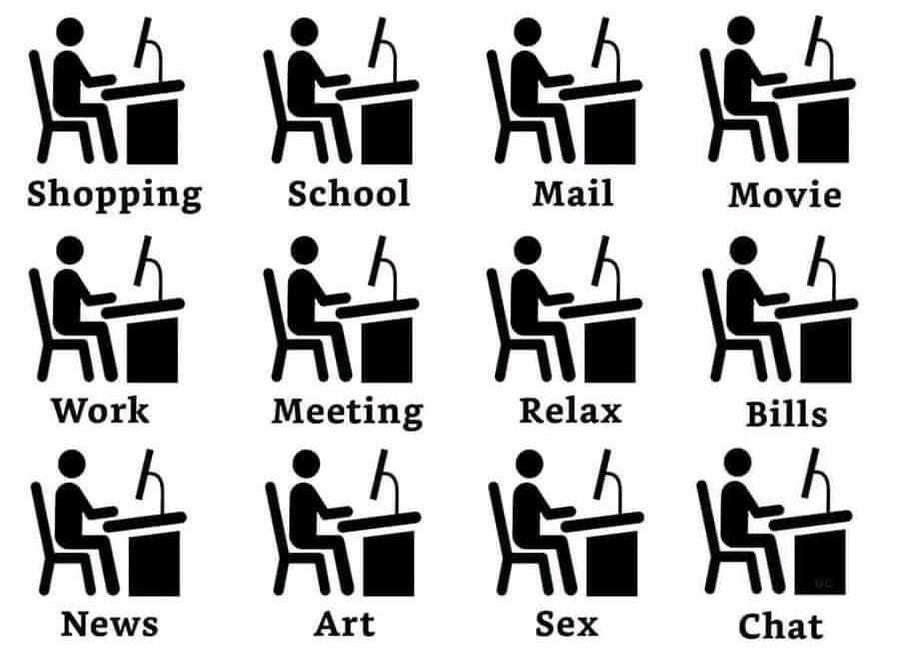Context Collapse (Addendum)
(This post is a short addendum to Context Collapse and the Death of the Freak. Note that I’ve added an audio reading of that article, for those who prefer to listen. You will also find the audio version posted to The Filter podcast feed. Finally, keep your eye out for a new paid-subscriber post this Friday, based on a suggestion from a reader.)
Shortly after hitting publish on my last article, I came across the image above. Clearly, the idea of context collapse goes much deeper than just the assimilation of the freak, and freakish behavior, into everyday life. It seems as if all of our contexts have collapsed, and are continuing to do so. In another ten years, the cookie-cutter icons in the image above might show someone staring into a VR headset, transmitting wirelessly to the Neuralink chip grafted onto their brain.
One of the aspects of this great flattening that’s often hinted at, but I don’t see discussed directly, is the way in which the domestic is merging with, and at times eating, all other contexts. We saw this explicitly with the lockdowns, when anyone who could work from home was told to do so, and many of those who couldn’t were told to just stay home, period. One word for forced domestication is captivity, and if you add in the requirement for public performance (work), our lockdown lives resembled those of zoo animals, with webcams replacing the space between bars as the window into our domestic lives. It’s not the slightest bit surprising to me that mating went way down during those early months of captivity in 2020, while the number of people caught on their work cams doing decidedly non-work things went way up.
Even as work fully penetrated the home, employees (especially younger ones) began to record videos showing just how much their jobs resembled life in an upscale dorm, with the occasional meeting sprinkled in between yoga sessions and “unwinding” with free wine on tap. The ultimate context annihilator at work is the cell phone, which at any moment could summon you to an urgent product meeting, or let you know some celebrity just died (suddenly, of course). Or maybe it’s your boyfriend asking what he should pick up for dinner, or your BFF who just posted a new pic to Insta and OMG how does she look so good it has to be a filter, right? Work no longer has distractions, work is just one more perturbation of your ongoing domestic life.
Five years and a lifetime ago, I was hired by a startup in the decentralized tech (blockchain) world to do some system architecting. At one point, deep in thought, a co-worker found me hidden away in a quiet corner of the kitchen (our office was the founder’s condo, and he was nice enough to let us eat his prepared meal deliveries, which I must say was awesome). The 20-something co-worker wanted to know why I hadn’t replied to a slack message he sent me all of two minutes ago. Uh, because I was hired to think, and that’s what I’m trying to do? But there was no use getting upset. He lived in a world where context was already dead. This wasn’t an interruption, it was co-habitation, and it probably didn’t matter whether the question he had was about code or who ate the last ginger garlic chicken.
Context is maintained through formal differences, and limiting of exposure. The icons at top represent the collapse of formal differences: work looks like shopping looks like bill paying looks like relaxing, enticing us to slip between activities that were once visually distinguishable. Meanwhile, even as I hid away next to the pantry and shamefully ignored my slack messages, I was highly exposed to that impatient co-worker. Right now, as I type this, I’m exposed to any number of seemingly urgent messages that might come in, related to anything and everything. That’s the push side of things. On the pull side, I’m exposed to the ever-present temptation to shift over to some other activity from the image, or beyond, because I’m continually connected to a device that can let me shift within seconds. Which is to say, any context that exists in my life has to be carved out, by me, against all the forces that want to destroy it. The vast majority of those forces want to commandeer my attention work with the temptations of the domestic.
Work is hard. Domestic life — especially with a moderate level of wealth — is comfortable. It’s shopping and movies and Uber eats and scrolling news feeds and chatting on social media. The long arc of human history bends towards domestication, from hunter-gatherer to farming to work-from-home, because that’s what feels good, man.
Transhumanism represents a final collapse of context into fully managed captivity, the terminal end to formal differentiation and private spaces.

